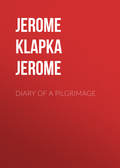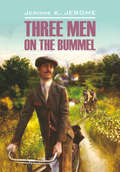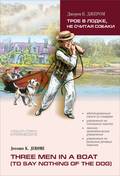
Джером К. Джером
The Philosopher's Joke
"I did not catch your name," he was saying. "Would you mind telling it to me?"
She turned her face towards him. It was the most spiritually beautiful face he had ever seen. "I am in the same predicament," she laughed. "You had better write yours on my programme, and I will write mine on yours."
So they wrote upon each other's programme and exchanged again. The name she had written was Alice Blatchley.
He had never seen her before, that he could remember. Yet at the back of his mind there dwelt the haunting knowledge of her. Somewhere long ago they had met, talked together. Slowly, as one recalls a dream, it came back to him. In some other life, vague, shadowy, he had married this woman. For the first few years they had loved each other; then the gulf had opened between them, widened. Stern, strong voices had called to him to lay aside his selfish dreams, his boyish ambitions, to take upon his shoulders the yoke of a great duty. When more than ever he had demanded sympathy and help, this woman had fallen away from him. His ideals but irritated her. Only at the cost of daily bitterness had he been able to resist her endeavours to draw him from his path. A face – that of a woman with soft eyes, full of helpfulness, shone through the mist of his dream – the face of a woman who would one day come to him out of the Future with outstretched hands that he would yearn to clasp.
"Shall we not dance?" said the voice beside him. "I really won't sit out a waltz."
They hurried into the ball-room. With his arm about her form, her wondrous eyes shyly, at rare moments, seeking his, then vanishing again behind their drooping lashes, the brain, the mind, the very soul of the young man passed out of his own keeping. She complimented him in her bewitching manner, a delightful blending of condescension and timidity.
"You dance extremely well," she told him. "You may ask me for another, later on."
The words flashed out from that dim haunting future. "Your dancing was your chief attraction for me, as likely as not, had I but known?"
All that evening and for many months to come the Present and the Future fought within him. And the experience of Nathaniel Armitage, divinity student, was the experience likewise of Alice Blatchley, who had fallen in love with him at first sight, having found him the divinest dancer she had ever whirled with to the sensuous music of the waltz; of Horatio Camelford, journalist and minor poet, whose journalism earned him a bare income, but at whose minor poetry critics smiled; of Jessica Dearwood, with her glorious eyes, and muddy complexion, and her wild hopeless passion for the big, handsome, ruddy-bearded Dick Everett, who, knowing it, only laughed at her in his kindly, lordly way, telling her with frank brutalness that the woman who was not beautiful had missed her vocation in life; of that scheming, conquering young gentleman himself, who at twenty-five had already made his mark in the City, shrewd, clever, cool-headed as a fox, except where a pretty face and shapely hand or ankle were concerned; of Nellie Fanshawe, then in the pride of her ravishing beauty, who loved none but herself, whose clay-made gods were jewels, and fine dresses and rich feasts, the envy of other women and the courtship of all mankind.
That evening of the ball each clung to the hope that this memory of the future was but a dream. They had been introduced to one another; had heard each other's names for the first time with a start of recognition; had avoided one another's eyes; had hastened to plunge into meaningless talk; till that moment when young Camelford, stooping to pick up Jessica's fan, had found that broken fragment of the Rhenish wine-glass. Then it was that conviction refused to be shaken off, that knowledge of the future had to be sadly accepted.
What they had not foreseen was that knowledge of the future in no way affected their emotions of the present. Nathaniel Armitage grew day by day more hopelessly in love with bewitching Alice Blatchley. The thought of her marrying anyone else – the long-haired, priggish Camelford in particular – sent the blood boiling through his veins; added to which sweet Alice, with her arms about his neck, would confess to him that life without him would be a misery hardly to be endured, that the thought of him as the husband of another woman – of Nellie Fanshawe in particular – was madness to her. It was right perhaps, knowing what they did, that they should say good-bye to one another. She would bring sorrow into his life. Better far that he should put her away from him, that she should die of a broken heart, as she felt sure she would. How could he, a fond lover, inflict this suffering upon her? He ought of course to marry Nellie Fanshawe, but he could not bear the girl. Would it not be the height of absurdity to marry a girl he strongly disliked because twenty years hence she might be more suitable to him than the woman he now loved and who loved him?
Nor could Nellie Fanshawe bring herself to discuss without laughter the suggestion of marrying on a hundred-and-fifty a year a curate that she positively hated. There would come a time when wealth would be indifferent to her, when her exalted spirit would ask but for the satisfaction of self-sacrifice. But that time had not arrived. The emotions it would bring with it she could not in her present state even imagine. Her whole present being craved for the things of this world, the things that were within her grasp. To ask her to forego them now because later on she would not care for them! it was like telling a schoolboy to avoid the tuck-shop because, when a man, the thought of stick-jaw would be nauseous to him. If her capacity for enjoyment was to be short-lived, all the more reason for grasping joy quickly.
Alice Blatchley, when her lover was not by, gave herself many a headache trying to think the thing out logically. Was it not foolish of her to rush into this marriage with dear Nat? At forty she would wish she had married somebody else. But most women at forty – she judged from conversation round about her – wished they had married somebody else. If every girl at twenty listened to herself at forty there would be no more marriage. At forty she would be a different person altogether. That other elderly person did not interest her. To ask a young girl to spoil her life purely in the interests of this middle-aged party – it did not seem right. Besides, whom else was she to marry? Camelford would not have her; he did not want her then; he was not going to want her at forty. For practical purposes Camelford was out of the question. She might marry somebody else altogether – and fare worse. She might remain a spinster: she hated the mere name of spinster. The inky-fingered woman journalist that, if all went well, she might become: it was not her idea. Was she acting selfishly? Ought she, in his own interests, to refuse to marry dear Nat? Nellie – the little cat – who would suit him at forty, would not have him. If he was going to marry anyone but Nellie he might as well marry her, Alice. A bachelor clergyman! it sounded almost improper. Nor was dear Nat the type. If she threw him over it would be into the arms of some designing minx. What was she to do?






